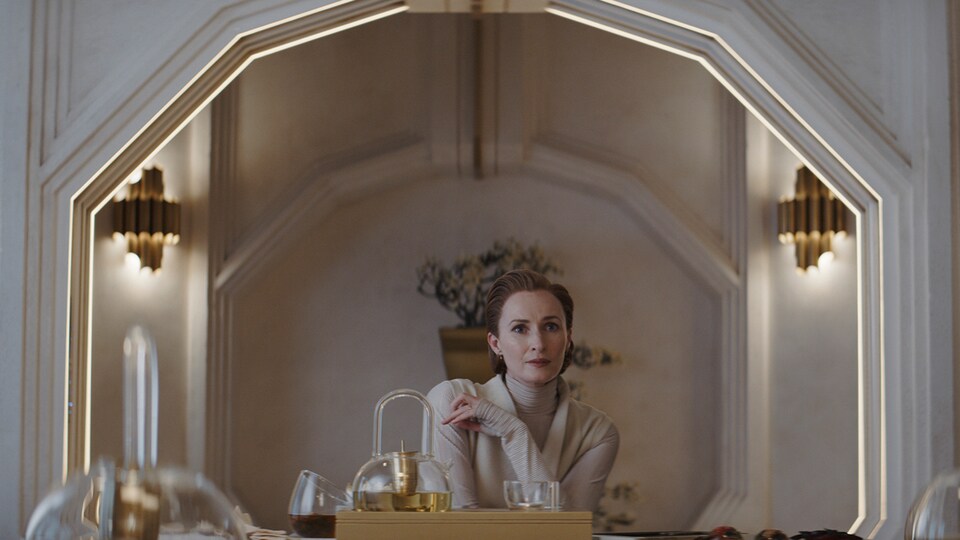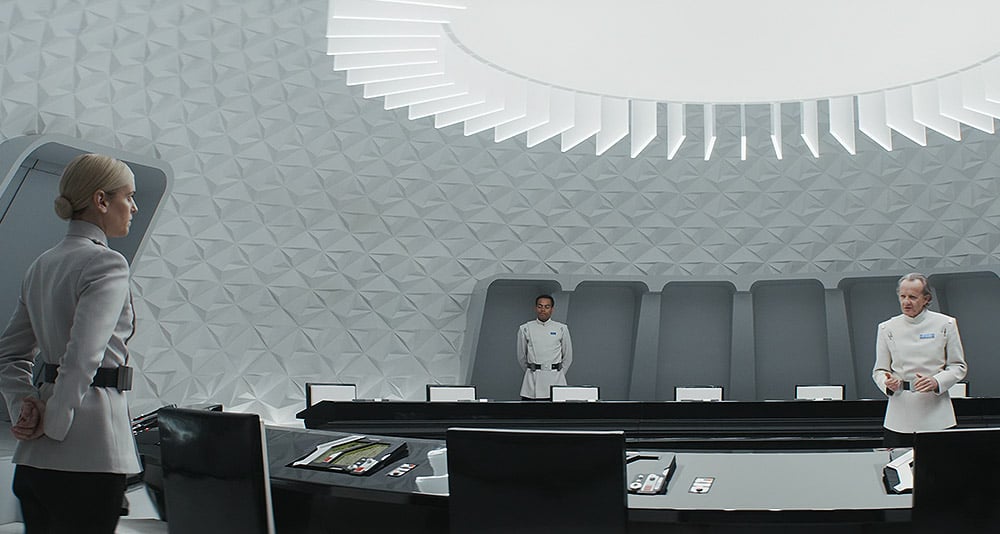Andor reaches beyond the Star Wars franchise to become a truly amazing feat of television and anti-fascist storytelling.
I like to start fights by saying Rogue One (2016) is the best Star Wars film (okay, okay, on par with The Empire Strikes Back [1980]). While hyperbolic, I did love Rogue One for taking the topic of revolution seriously, for the diverse cast, and for lines that live on in my memory: “Rebellions are built on hope.” At the announcement of Andor, I was cautiously optimistic, but regardless, I was glad to see Diego Luna get more screentime. At best, I figured we might get something as fun as Mando. Andor is so much more.
Andor is a prequel series to Rogue One, following Cassian Andor (Diego Luna) as he becomes the Cassian willing to give it all for the rebellion. In the first arc of Andor, we meet a Cassian that is only a spark of the rebel leader he will one day become. His reputation in the working-class community on Ferrix is that he doesn’t work enough, he should take better care of his adopted mother Marva (played brilliantly by Fiona Shaw), and he owes too many people too much money. Even so, his community takes care of him and helps him out, such as letting him borrow a ship to go look for his missing sister at a nearby club, where he has an altercation with two security officers, leading to Cassian killing both officers.
This altercation is only the first of many with different types of private and imperial security forces that drive much of the plot of Andor. The need to avoid detection leads Cassian to try to sell a piece of imperial technology to an off-world buyer arranged for by his friend, Bix (Adria Arjona). Unknown to Cassian, this buyer has connections to the emerging rebellion. Luthen Rael (played perfectly by Stellan Skarsgård) convinces Cassian to help a rebel mission on the occupied planet of Aldhani. Thus, the second arc of Andor begins as Cassian is the getaway driver for a heist against the Empire.
While there are two more arcs in this twelve episode series, I’m going to shift to broad strokes to avoid detailing too many spoilers. One reason Andor surpasses much of the more recent Star Wars offerings is due to the show’s understanding of empire. For the first time since I watched the original trilogy, the Empire didn’t feel like just an arch-villain but truly an empire. Throughout the show, the Empire is depicted as an imperial force occupying planets, oppressing indigenous people for resource extraction, policing working class communities, and controlling populations through the prison system. Without every using the F-word, showrunner Tony Gilroy demonstrates how imperialism and fascism go hand-in-hand. For once, the rebellion has real stakes for oppressed communities, not just a handful of characters we have come to love.
Another aspect I’ve been missing from current Star Wars properties are the visual masterpieces of the original trilogy. Andor not only tells a great story but does so with style. Some of my favorite aesthetics were the views of Coruscant and Senator Mothma's (Genevieve O’Reilly) house, though the cold, hard-edged Imperial Security Bureau set the tone for the imperial actions throughout the show. Similarly, I often found myself struck by the sweeping cinematography or the use of lighting to heighten a scene.An early critique I heard floating around about the show was that the first episodes were slow. In the context of other Star Wars shows, the pacing is different in Andor, partially because it’s a longer series of twelve episodes, with multiple mini-arcs and climaxes leading to a finale set on Ferrix. Additionally, Andor is, at its heart, a spy show. Showrunner Tony Gilroy, the original writer of Rogue One, is better known for being the writer of the original Bourne trilogy, and those beats and tropes certainly come into play through characters like Luthen Rael, essentially Cassian’s handler. Andor is not just the story of Cassian’s growth into a rebel leader, but also how the rebellion’s network is created.
Finally, I can’t wrap up this review without talking about the casts' amazing deliveries. Diego Luna is consistently strong throughout as Cassian grows into a leader. His delivery is only heightened by the award-worthy performances of the secondary characters, particularly Andy Serkis as Kino Loy, a prisoner, who gives what will be considered one of the greatest monologues in the Star Wars franchise, alongside monologues by Skarsgård and Shaw. The women of the show can’t be forgotten, either, with Denise Gough playing the most interesting antagonist: Lieutenant Dedra Meero of the Imperial Security Bureau. Similarly, Genevieve O’Reilly reprises her role as Senator Mon Mothma in Andor and makes the political machinations of watching democracy die not just interesting but breathless. Both Gough and O’Reilly are tasked with many bureaucratic scenes but yet make them thrilling.
When I sat down to watch this latest Disney show, I didn’t expect a near-perfect anti-fascist show that discusses everything from police brutality, incels, prison conditions, infighting among leftist groups, mutual aid, imperial infrastructure—and on. At the same time, Andor is an edge-of-your seat spy thriller with heists, battles, protests, and political machinations. With truly excellent acting from the entire cast, this show raises the bar for not just Star Wars or other Disney productions, but television streaming in general.
The Math
Baseline Assessment: 10/10
Bonuses: Not just an amazing Star Wars story, but an incredible feat of storytelling.
Nerd Coefficient: 10/10 (very high quality/standout in its category)
Posted by: Phoebe Wagner (she/her) is an author, editor, and academic writing and living at the intersection of speculative fiction and environmentalism. She tweets as @pheebs_w or find her online at phoebe-wagner.com.


